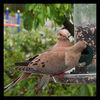Check out AI Artistry and Creation section of our forum.
The Learning Curve
Feb 20, 2016 08:24:38 #
DerBiermeister wrote:
Thanks -- I will do so. I usually find however that owner's manuals are not structured well for learning. They may have all the information within, but do not take you through a logical learning process.:)
That is why you read the manual initially when the information will be somewhat foreign to you, use the camera for a while to become more familiar with it, and then go back and read the manual again when things will make more sense to you. You will retain much more info the second time.
Thereafter, use it as a reference manual only.
Feb 20, 2016 08:28:12 #
Feb 20, 2016 08:36:36 #
Study composition. Effective composition will improve your photographs.
DerBiermeister wrote:
As I said in the Introduction forum, I am brand ne... (show quote)
Check out Wedding Photography section of our forum.
Feb 20, 2016 08:57:20 #
http://canontrainingvideo.com/index.php?main_page=product_info&cPath=3&products_id=66
I am more of a visual learner and found this guy's video very valuable. He takes you step by stept for your cameras setup. This is how i learned to use my Canon 60D. I sat at the computer with my camera and manual The second part of the video contains his photography school. You won't be dissappointed. He is also on youtube so google Miichael Andrew or Michael the Maven. It says Canon training but he alo produces videos for Nikon. He has one specifically for the 5300.
I am more of a visual learner and found this guy's video very valuable. He takes you step by stept for your cameras setup. This is how i learned to use my Canon 60D. I sat at the computer with my camera and manual The second part of the video contains his photography school. You won't be dissappointed. He is also on youtube so google Miichael Andrew or Michael the Maven. It says Canon training but he alo produces videos for Nikon. He has one specifically for the 5300.
Feb 20, 2016 09:11:17 #
Shoot pictures 100's and 100's of pictures.Try different settings. Then shoot 100's and 100's more. Digital film costs zilch. Shoot a 1000 shots and you will know your camera. The shutter is good for minimum of 140000 more shots so those will all be stunning photos cos you know the camera. Using it and consulting the manual in between lots of shooting is how you learn it.
Enjoy it is the main thing.
Enjoy it is the main thing.
Feb 20, 2016 09:18:03 #
If I find I do not like the free youtube videos that abound, I will spend the $38 bucks for the Michael Andrew course.
Thanks for the link.
Thanks for the link.
Feb 20, 2016 09:29:08 #
I thank everyone for the great inputs. While I may not respond to each post, trust me, I am reading them and will follow the advice.
I watched this video yesterday -- found it to be pretty informative.
Are any of you familiar with this guy's videos?
http://www.youtube.com/watch?v=Cr1Zj76Inh4
I watched this video yesterday -- found it to be pretty informative.
Are any of you familiar with this guy's videos?
http://www.youtube.com/watch?v=Cr1Zj76Inh4
Check out Film Photography section of our forum.
Feb 20, 2016 09:30:58 #
ronwande wrote:
I suspect you can find and download the manual for your new camera. DSLR manuals are usually pretty good cures for insomnia read late at night. If you watch TV in the evening, have it handy and read during commercials. :-)
Thanks for that.
I usually remember to get my manuals online - not sure why I didn't think of it this time. :roll:
I just downloaded it and will spend sometime today perusing it to see how it is structured. Like others have suggested, I am not going to dive into it too deeply, especially not having the camera yet.
Feb 20, 2016 09:36:51 #
Adicus wrote:
How to eat an elephant is one bite at a time. Just take it slowly and you will get there, as I can tell from your post that you are mad keen to learn .
:thumbup:
There is just too much in any of the books, to learn it all in a relatively short time!
Here's what I (still) do:
I read a bunch of the articles on this forum, and when something appeals to me, I see if I can do the same thing with my camera.
But what I like best: When the weather is miserable (right now it's supposed to be mid-winter and all we get is rain!!!), I make myself a large mug of hot chocolate, turn the fireplace on, and make myself comfortable on the couch, with my camera, lenses, books about my camera, highlighter pen, pen and paper and small laptop, all within easy reach. Then I start flipping through the books till I see something that looks interesting. I read that paragraph and or chapter, also look up the same/similar in the other books (I have the user's guide plus two "outside" books for my camera). Finally, I hope I understood what it said and try it with the camera.
The wall, tv, window and husband, all across from where I sit, are the most photographed objects in this house.
I do make notes of what I do (settings are in the exif data, no need to record those).
I've been doing this for some time now, have learned a lot, and as long as the hot chocolate and my spot on the couch are patient, I'll be learning more - on little thing at a time.
The beauty of photographing things right away, is that I can immediately see if the results are what I should expect, or if I should tweak a setting, or use a different lens.
In any case, all our learning curves are different, some very long and slow, others very steep and fast, but if we want to get there, we'll all reach the top - just not at the same time.
Have fun with your new toy when it comes!
Feel free to post more questions here on the forum, you'll likely get some good answers, some bad answers and some non-answers, but althogether, there's a pretty good crew on board the "UHH."
Feb 20, 2016 09:48:15 #
DerBiermeister wrote:
As I said in the Introduction forum, I am brand ne... (show quote)
Welcome aboard. The Nikon manuals that they include wit heir cameras are not very easy to follow. David Busch writes manuals for all popular cameras and they are wonderful, explain everything, and available at most bookstores or on-line at fair price. Get one for the D5300. You will love it. It will certainly make a difference in th learning curve and make things easier. It did for me!
Feb 20, 2016 10:25:52 #
DerBiermeister wrote:
As I said in the Introduction forum, I am brand ne... (show quote)
Having an engineering background myself, I find that the artist and engineering go hand in hand. The artist allowed me to create designs and the engineering discipline kept those within the bounds of reality. The discipline provided me the necessary skills to solve the problems presented by limits of the medium and creatively working with or around them.
The problems are solved similar to engineering a little bit at a time. The first one grasping the knowledge of the photographic medium. You're off to a good start. Just tackle one problem at a time and combine that acquired knowledge to the next problem and keep building. Your engineering will come in handy.
--Bob
Check out Black and White Photography section of our forum.
Feb 20, 2016 10:27:47 #
Bill_de wrote:
Lesson one - stop thinking like an EE and start thinking like an artist. :lol:
Welcome aboard!
--
Welcome aboard!
--
Nonsense. The engineering will provide valuable assets that will lead to a better understanding and solution to photographic principles.
--Bob
Feb 20, 2016 10:55:43 #
Elsiss wrote:
Welcome aboard. The Nikon manuals that they include wit heir cameras are not very easy to follow. David Busch writes manuals for all popular cameras and they are wonderful, explain everything, and available at most bookstores or on-line at fair price. Get one for the D5300. You will love it. It will certainly make a difference in th learning curve and make things easier. It did for me!
Had to backorder it from Amazon, but because you buy the paperback - you get the Kindle version for only 3 bucks. So I ordered that too -- always have it with me on my smartphone. Thanks
Feb 20, 2016 10:58:16 #
sirlensalot
Loc: Arizona
DerBiermeister wrote:
As I said in the Introduction forum, I am brand ne... (show quote)
Cameras can be a bit frustrating to learn, but not mysterious. Reading and learning the manual will be the biggest obstacle you will face getting started. Cannot emphasize this enough.
Also IMO, the best second thing to learn after your camera is light and lighting, how it affects exposures. I have always thought our greatest photographers are those that have embraced light as their friend instead of treating it as something to be conquered. I think many of us, including myself, fall somewhere between.
Know the capabilities of your camera and gear as you add equipment, understand how light affects exposures and how to use it for what you are trying to portray and the rest is pretty easy.
Your best tool (IMO), towards taking great shots after learning about the camera and light is a tripod.
Feb 20, 2016 11:11:46 #
Tony Northrup's DSLR Book: How to Create Stunning Digital Photography. This is a great tool. He explains and subject and than has a video on it. It has free updates on the tablet version. I also have an Engineering background. I think it helps with the technical things. I've looked at pictures I've taken a few years ago and think "Yikes!" I've learned a lot from the nice people on this forum also. Good luck, and have fun.
If you want to reply, then register here. Registration is free and your account is created instantly, so you can post right away.
Check out True Macro-Photography Forum section of our forum.






